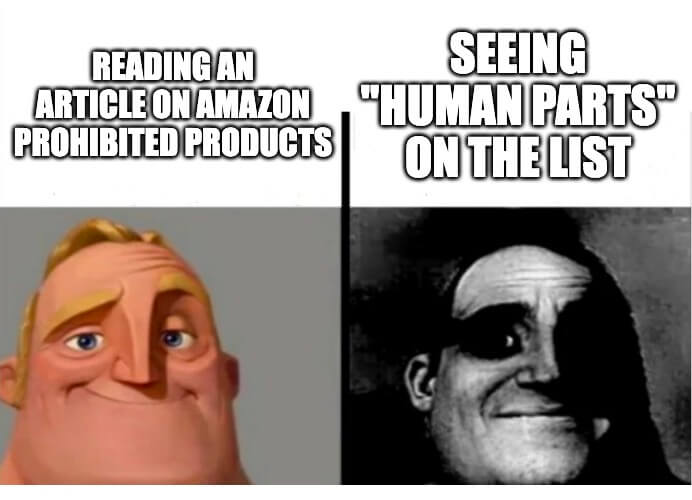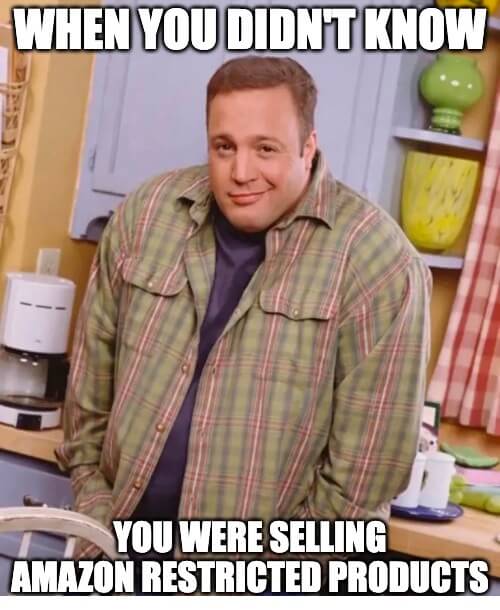Full List of Amazon-Restricted Products As of 2025 (And Why)
by Chad de Lisle • September 15, 2025
Amazon has helped many e-commerce businesses reach untapped audiences and expand their presence in ways they never imagined were possible. In a time where almost everything imaginable has been invented, marketed, and sold, lucrative products are the best way to stand out, but what if yours falls into the Amazon-restricted products category?
Well, that’s what we’re here to talk about!
This article will cover the extensive list of restricted categories on Amazon so you can avoid some pretty hefty punishments (*more on that later).
Defining Amazon Prohibited Products
“Restricted categories” on Amazon fall under two descriptions:
- Products Amazon doesn’t allow sellers to list.
- Products that require the seller to apply for approval.
Because laws and restrictions may vary by geographic location, not everything is completely off-limits to sell.
These regulations exist to keep you and your business on the safe side and make sure you’re not getting into trouble when selling, and not getting Amazon into trouble, either. It is a 3rd party marketplace after all, they have to protect themselves.

Best Practices for Amazon Sellers
Before we get into the list of restricted categories, let’s talk about how you can protect yourself from surprises.
Check Competitor Listings
If you’ve spotted a high-demand product but only a few sellers are offering it, take a closer look. Limited competition often means restrictions are in play, like brand gating, category approval, or special certifications.
And if Amazon itself is the only seller, that’s a strong sign you’ll need extra approval (if you can sell it at all).
Document Your Checks
A product that’s clear in 2025 could become restricted next year. To avoid headaches, document every step when you check an ASIN. Screenshot your results, keep notes on the date, and record which method you used.
Having a simple paper trail shows you did your due diligence if a product’s status suddenly changes.
Stay on Top of Policy Updates
Amazon doesn’t always wave a big red flag when it adjusts restrictions. Instead, you’ll see updates tucked into Seller Central announcements or account health metrics. Make it a habit to check these regularly.
Some sellers even use third-party tools or compliance resources that track restriction updates across categories, handy if you’re juggling multiple marketplaces.
Know Your Marketplace Rules
Not all restrictions are universal. What’s gated in the U.S. might be perfectly fine in Canada or the EU, and vice versa. That’s why it’s important to confirm eligibility in each marketplace you plan to sell in. Otherwise, you could end up with inventory stuck in limbo because it cleared one country’s rules but failed another’s.
Build Compliance Into Your Research
Checking restrictions shouldn’t be an afterthought. Treat it as part of your sourcing process, right alongside profit margins and demand analysis. Ask yourself: Does this product contain batteries, liquids, or chemicals? Does it belong to a category that’s historically gated? Is brand approval required?
Thinking through these questions early helps you avoid costly inventory mistakes!
Restricted Categories on Amazon As of 2025
The list of Amazon-restricted products is extensive, but as you begin to dive into them you can start to see why they’re not allowed to be sold on the platform.
Alcohol
Alcohol sales are restricted on Amazon because of the complex regulations that apply to alcohol by state. And no, it’s not just in of Utah. Alcohol-related accessories and wine sold by pre-approved sellers are okay in some states, but alcoholic distillation kits and products that contain raw alcohol are a no-no.
Animals & Animal-Related Products
If you were hoping to skip the trip to Petco, there’s no 2-day shipping option on hamsters (sad, right?). Animal sales are restricted on Amazon for obvious reasons, such as animal welfare and preventing illegal trade.
Permitted listings, though, include insects, shellfish and crustaceans, and faux animal products.
Art: Fine Art
The art market is complicated. Selling fine art on Amazon is restricted due to quality and authenticity concerns. Permitted items include one-of-a-kind pieces, prints, and secondary-sale works, but the Amazon Fine Art Store prohibits three-dimensional artwork and archaeological-based art.

Art: Home Decor
Like the fine art category, replicas and reproductions are fine to sell on Amazon, but unauthorized copies or reproductions that violate copyright laws aren’t.
Automotive and Powersports
Automotive batteries, tires, and other parts that meet compliance standards are a-okay to sell on Amazon, but the trouble comes when businesses try and list products that may interfere with the proper operation of an engine’s emission control systems.
To put it simply, pump the brakes on selling products that make your vehicles function like something out of a Fast and Furious movie. Modifications like these don’t fly.
Oh yeah, you also aren’t allowed to sell driver’s licenses and other government-issued identification cards. Sorry McLovin!

Children’s Apparel & Footwear
For kids’ clothes, Amazon has some strict rules. These rules cover clothing for children aged 12 and under, except for sleepwear. They include stuff like safety tests, flammability tests, small parts checks, and tracking labels. So, if you’re selling these, be ready to share your business info, contact details, product images, labels, instructions, and test reports when Amazon asks.
Composite Wood Products
If you’re selling products with certain types of composite wood, understanding Amazon-restricted products is crucial. These rules relate to hardwood plywood, medium-density fiberboard (including thin-MDF), and particleboard, which are collectively called “regulated composite wood.”
You’re good to go if your products with regulated composite wood meet these EPA standards and labels. But, if they don’t, or if they’re not labeled as per EPA requirements, then you can’t sell them on Amazon.
Cosmetics, Skin, and Hair Care
The sale of cosmetic items on Amazon is permitted, but there are some restrictions to watch out for. To keep things compliant, make sure your cosmetics are in their original packaging, new, and clearly labeled with identifying codes.
The labels and product detail pages should be in English, and they should include essential details like the product name, purpose, quantity, ingredients, and manufacturer information. Just remember not to make any health claims unless you have FDA approval, and don’t use the FDA logo.
Cosmetics include products like creams, perfumes, makeup, and more used for personal care.
CPAP Cleaning and Disinfecting Devices
There are two primary types of medical devices that claim to clean CPAPs. One type uses ozone gas, the second type uses ultraviolet (UV) light. The FDA has not approved or cleared either type of machine to clean CPAPs. In fact, the FDA expressly communicated to Amazon that the above types of cleaning devices are unapproved.
Class I and Class II non-exempt medical devices must be cleared by the FDA for sale in the U.S. (for more information, see 510(k) Clearances). Only products that comply with FDA requirements and are authorized may be sold on Amazon.
Currency, Coins, Cash Equivalents, and Gift Cards
If you’re involved in trading precious metals, stones, or jewels, Amazon requires compliance with 31 C.F.R. Part 1027 and relevant regulations. Dealers are expected to furnish copies of their anti-money laundering programs when requested by Amazon.
Items categorized as exonumia, like medals, medallions, challenge coins, and commemorative coins primarily not made of precious metals, are exempt from this policy.
To be listed in the Collectible Coins category, prior approval from Amazon is necessary. For detailed guidance, visit the Collectible Coins Seller Help page.
Prohibited listings consist of items like altered legal tender, paper money, imitation currency, commemorative medals, and counterfeit coins and paper money.
Dietary Supplements
Dietary supplements include a range of health products, and they must be correctly packaged, labeled, and compliant with Amazon policies. That means they should be sealed in the original packaging, brand-new, and clearly marked with identifying codes.
The labels need to be in English and include crucial details like the product name, quantity, ingredients, and manufacturer information.
Like cosmetics, you can’t make any claims about curing diseases or mimic prescription drugs, and you definitely can’t say your supplements are “FDA approved” or use the FDA logo.
Drugs and Drug Paraphernalia
Drugs, which include substances for treating diseases, altering bodily functions, or even enhancing appearance, must be correctly labeled and packaged. They should be sealed in the original manufacturer’s packaging, brand-new, and have identifiable codes from the manufacturer or distributor.
The ‘other’ types of drugs, obviously, are prohibited.
Electronics
Electronics should adhere to industry standards, not interfere with other devices, and avoid circumventing technical controls like copyright protection.
Here are some examples of what’s not allowed:
- Products that violate Radio Frequency Devices and Laser Products policies.
- Items with altered or removed serial numbers.
- Devices intended to block or interfere with law enforcement signals or descramble cable or satellite TV.
- Products promoting or facilitating copyright infringement.
- Electronics that improperly unlock cell phones or modify SIM cards.
- Streaming media players that enable unauthorized access to digital media.
Explosives, Weapons, and Related Items
When selling weapons, imitation weapons, or related accessories on Amazon, strict adherence to federal, state, and local laws is non-negotiable. Ensure compliance with applicable regulations, including licensing, and stay vigilant about geographic sales restrictions.
Amazon prohibits the sale of firearms, ammunition — with exceptions for non-lethal types — explosives, and certain accessories, like those associated with assault weapons. Similarly, certain knives and items resembling harmless objects are also restricted.
Federal Emissions: Products Requiring EPA Certificate of Conformity
In the United States, the Clean Air Act mandates that manufacturers and importers of fuel-powered engines and vehicles must obtain a US Environmental Protection Agency (EPA) Certificate of Conformity (COC) to prove compliance with federal emissions standards before selling or importing these products.
This regulation applies to various items, including fuel-powered engines, lawnmowers, generators, marine motors, motorcycles, and more. To list these products on Amazon, you must provide a valid EPA COC number for each item.
Food & Beverage
If you’ve got properly prepared and sealed foods and beverages that are shipped with care, Amazon’s okay with that. Just make sure your packaging has the product name, the name and address of the packaging company, an expiration date, and the net content quantity and weight (that’s the weight of the actual contents, not the packaging).
For products that are shelf-stable for more than 90 days, you’re in the clear, but perishable stuff should be pulled from inventory 50 days before their expiration date. If you’re using Amazon’s fulfillment service (FBA), they’ll take care of removing units within 50 days of expiration to keep things fresh and safe.
Amazon FBA restricted products typically adhere to the same regulations.
Gambling & Lottery
This one is as easy as putting a coin in a slot machine.
Permitted Products: You can list non-functional slot machines that are made for display or as toys.
Prohibited Products: Listings for lottery tickets, coin-operated slot machines, or slot machines that can be converted to use coins or currency are not allowed.
Hazardous Items
Amazon prohibited products include any that can pose a risk to your health. Listings for potentially hazardous items must comply with Department of Transportation rules and relevant laws.
Allowed products include specific batteries, firefighting foam, and certified containers.
Prohibited items consist of explosives, hazardous chemicals, fireworks, certain PFAS and BPA products, inflatable neck floats for kids, explosive device-related items, military-style gas masks, mercury-containing products, and novelty magnets like Buckyballs.
Human Parts & Burial Artifacts
This one will blow your mind. Listings for human skulls, bones, and skeletons for medical use are allowed when permitted by local regulations. Additionally, human hair products, including wigs, are good to sell.
But, selling items like human body parts, remains, waste, fluids, historical grave markers, Native American burial items, or artifacts taken from protected lands is prohibited on the platform.

Jewelry & Precious Gems
Listings for gold or silver products that lack proper compliance stamps or products that don’t adhere to the FTC’s guidelines for jewelry, precious metals, and pewter industries are not permitted. On this list are also irradiated gemstones that can only be sold with authorization from the Nuclear Regulatory Commission.
Non-compliant diamonds with the Kimberley Process Certification Scheme, clarity-enhanced white diamonds, and glass-filled rubies are also prohibited.
Laser Products
Amazon has specific safety policies regarding laser products.
- Laser pointers, including handheld laser pet toys and 303s, are generally not allowed.
- Laser presentation remotes may be sold with prior approval, as they are primarily used for presentations.
- Non-handheld laser pet toys, children’s toys with lasers, laser light shows, garden laser projectors, and infrared illumination lasers for surveillance and security equipment may be sold with prior approval, provided they meet certain safety standards.
To apply for approval to sell these products, sellers need to provide their company information, seller ID, contact details, a list of laser product ASINs, documentation of FDA accession numbers, and evidence of testing by a nationally recognized testing laboratory.
Lighting
Lighting products that conform to federal, state, and local laws and align with Amazon policies are permitted listings. However, prohibited listings include light bulbs and lamps that infringe upon energy efficiency standards.
Additionally, adapters or converters intended for installing incandescent lamps or lightbulbs without a medium screw base into fixtures or lamp holders with medium screw base sockets, operable within 110-130 volts, are not allowed.
Still with us? Just a couple more products to go!

Lock Picking & Theft Devices
You’re allowed to list blank keys, which can be handy for various purposes. But when it comes to locksmithing or lock-picking tools, Amazon prohibits listings of items like lock-picking sets, slim-jims, tension bars, or devices designed for key duplication.
They also have rules against shoplifting devices, such as Sensormatic detachers, as well as card skimming devices and code grabbers. So, while some key-related products are okay, others are a no-go on the platform.
Medical Devices and Accessories
Medical devices on Amazon are subject to strict FDA regulations. They distinguish between over-the-counter (OTC) and prescription-only (Rx) devices based on their potential harm to patients. Only sellers in Amazon’s Professional Healthcare Program (PHC) can offer Rx medical devices.
All medical devices must adhere to FDA requirements, including labeling in English with the manufacturer’s information and proper directions for use. Medical devices must not make false claims or misuse the FDA logo.
Medical devices are Amazon FBA restricted products, so shipments of Rx medical devices are prohibited.
Offensive and Controversial Materials
Amazon strictly enforces its Offensive Products policies for all products except books, music, videos, and DVDs. The company does not allow products that promote or glorify hatred, violence, racial, sexual, or religious intolerance, or organizations with such views. Listings that graphically portray violence or victims of violence are also removed.
This approach is meant to create a welcoming environment for Amazon’s global customers and sellers, fostering trust, respect, and adherence to the law. Amazon exercises judgment when allowing or prohibiting listings, considering cultural differences and sensitivities.
Pest Control Products and Pesticides
In the United States, the sale of pesticides and pesticide devices is governed by the Federal Insecticide, Fungicide, and Rodenticide Act (FIFRA) and local laws.
Proper labeling with valid EPA registration and establishment numbers is mandatory for all pesticides and pesticide devices. Sellers seeking to list these products on Amazon’s U.S. store must complete training, with eligibility limited to U.S. residents, and provide EPA registration information.
Prohibited listings include unregistered pesticides, products intended for non-U.S. markets, and those lacking proper EPA data. These stringent regulations ensure compliance with federal and state laws, fostering the safe and lawful sale of such products on Amazon’s platform.
Wow. That was a mouthful. Moving on!
Plant and Seed Products
Plants, plant products, and seeds must not be imported from outside the United States. The sale of live Christmas trees and greenery like wreaths and garlands on Amazon requires certification, and only approved vendors are eligible to list them.
When dealing with fertilizer products, you should be mindful of federal, state, and local regulations, including registration and licensing requirements.
Postage Meters and Stamps
You can sell supplies for postage meters and genuine stamps, except for USPS U.S. Flag Forever stamps. Collectible stamps are allowed if they provide essential details. Reproductions are permitted if clearly marked and described as such. Prohibited items include postage meter sales, counterfeit stamps, equipment for counterfeit stamps, and USPS U.S. Flag Forever stamps.
Recalled Products
Listings for products that have been recalled by the manufacturer and regulatory agencies like the CPSC, NHTSA, FDA, USDA-FSIS, or EPA, are not allowed on Amazon.
These recalls typically happen because a product is found to have safety issues, defects, or other problems that could potentially harm consumers.
Refrigerants: Ozone-depleting Substances and Substitutes
In the United States, regulations are in place to manage refrigerants that can harm the Earth’s ozone layer, known as “ozone-depleting substances” (ODS). These regulations, governed by the U.S. Environmental Protection Agency (EPA) and some states, restrict the sale and distribution of certain refrigerants classified as Class I or Class II ODS and Substitute Refrigerants.
Generally, the sale of these substances is limited to certified technicians through EPA-approved certification programs.
Strike Anywhere Matches
Amazon no longer permits the sale of products containing “strike anywhere” matches, which are matches that can be ignited by friction against any suitable surface without requiring a specially
prepared striking strip.
These Amazon-prohibited products are a massive fire hazard, especially if they’re used irresponsibly by children and teens.
Surveillance Equipment
Amazon allows you to sell products like video-only surveillance gear that won’t eavesdrop on conversations or hidden cameras for security.
You can even list baby monitors to keep an eye on the little ones. But, and it’s a BIG but, Amazon draws the line at secret-agent-style gadgets for intercepting conversations or hacking into communications.
Tobacco & Tobacco-Related Products
You can list products like ashtrays, cigar cutters, or hookahs, but no actual tobacco or e-cigarettes, whether they’re nicotine-free or not. Smoking cessation products like nicotine gum and patches are okay, but make sure they’re FDA-approved over-the-counter options.
As for those vapes, those are prohibited.
Warranties, Service Plans, Contracts, and Guarantees
Amazon takes its services and warranties seriously, and if you want to get in on this action, you’ll need to be pre-approved. Currently, they’re not accepting new applications for sellers in this category, but if you’re eager to join the club, you can reach out to warranty-svs@amazon.com.
They’ll give your account the once-over and let you know if you make the cut.
If you’re not one of the pre-approved sellers, you’ll have to hold off on listings like extended service warranties, money-back guarantees, replacement plans, service contracts, buy-back guarantee programs, and investment services.
Upholstered Furniture, Bedding, & Other Quilted Products
When it comes to selling furniture, bedding, and mattresses, it’s not just about aesthetics and comfort. There are legal requirements to consider. Federal laws govern what goes inside these products, and different states have their own rules about labeling.
They can get pretty detailed, like specifying the minimum label size and font. So, in addition to choosing the right design and materials, you need to ensure that your products comply with these regulations.
What To Do If You’ve Been Selling Amazon-Restricted Products
*There are some harsh penalties if you list Amazon-restricted products on the platform — Bezos does NOT mess around. If you find yourself in a situation where you’ve been caught listing on restricted categories on Amazon without getting the proper permissions, you could face the following consequences:
- Your listings can be canceled.
- You might be restricted on your listing privileges.
- You could be suspended from listing.
- You may lose your listing privileges altogether.
Luckily, there are some steps you can take to try and make amends with the e-commerce giant:
- Close/archive the restricted listing.
- State an appeal if you think the violation strike was a mistake.

How to Get Approval (Ungating) on Amazon
If you want to sell in a restricted category, you’ll need to go through Amazon’s ungating process.
Here’s how it works:
1. Gather the Right Documents
Amazon typically requires invoices from authorized distributors (not retail receipts), Letters of Authorization if you’re selling branded products, and any compliance certificates specific to your category (like CPCs for children’s items or CoAs for supplements).
Make sure your documents are clear, professional, and consistent with your Amazon seller account information.
2. Apply Through Seller Central
Search your target ASIN or category, click “Apply to Sell,” and upload the required documentation. Missing or mismatched details are one of the most common reasons for rejection.
3. Respond Quickly
Amazon may ask for additional verification. Reply within 24–48 hours to keep your application moving forward. Delays or incomplete responses can result in automatic rejection.
4. Stay Compliant Post-Approval
Approval isn’t a one-and-done process. Some categories require ongoing documentation or periodic recertification. Keep your records organized so you can stay compliant long-term.
Submit applications during standard business hours (Pacific Time). Amazon’s review teams are most active then, which can help speed up approvals.
The best way to avoid this is by making sure you’re all caught up on Amazon’s selling regulations, but when you’re trying to post a lucrative listing before anyone else, we get how hard it can be to want to wait.
Here are some quick tips for checking for product restrictions on your inventory.
How to Check if a Product is Restricted on Amazon
Amazon’s rules aren’t always obvious at first glance, and a little upfront research can save you from costly compliance issues later. Here’s how to check:
The Official Seller Central Method
Amazon provides a built-in way to verify product eligibility:
- Log in to Seller Central and go to Catalog > Add Products.
- Enter the product name or ASIN in the search bar.
- Click “Show limitations” to see any restrictions.
- Look at the action buttons:
- “Sell Yours” = you can usually list the product.
- “Apply to Sell” = restrictions apply, and approval may be required.
- “Sell Yours” = you can usually list the product.
Keep in mind: “Sell Yours” doesn’t always mean there are no restrictions. Additional steps, such as brand approval or hazmat clearance, may still apply.
Other Ways to Double-Check Restrictions
- FBA Calculator: If a product doesn’t appear here, it could indicate a restriction or listing issue.
- Category & Browse Tree Guides: Amazon’s category documentation can help you identify products that trigger restricted classifications.
- Product Detail Page: Look for warning messages, unusual shipping notes, or exclusive “Ships from and sold by Amazon.com” labeling, which may point to limitations.
- Brand Registry: Even in open categories, some brands require authorization. Check Amazon’s Brand Registry database before listing.
- Hazmat Review: If your product contains batteries, liquids, powders, magnets, or chemicals, you may need to submit it for a Dangerous Goods review before FBA acceptance.
Sell on Amazon the Right Way
If you’re looking to ramp up your Amazon campaigns, make sure you do it beside experts who can help you navigate the hurdles and make sure you don’t miss out on the rankings you deserve.
Disruptive Advertising offers Amazon Marketing Services that focus on strategy and revenue growth so you can reach the 89% of buyers that shop on Amazon over any other e-commerce site. Let’s start selling!





